02 Nov2020
By AACTE
On behalf of the Board of Directors of the American Association of Colleges for Teacher Education (AACTE), President and CEO Lynn M. Gangone issued the following statement today urging educators to resist the Trump administration’s attack on critical race theory and other anti-racism work in education:
“In its June 4 statement, the AACTE Board of Directors called educators to take courageous action on race matters in America to address not only recent racial injustices across the nation but also structural racism that has deep, historic roots in our society. Critical race theory represents the scholarly work of educators who provide research evidence and expertise on how the legacy of slavery and inequality in America has unequivocally influenced our American way of life, including our system of education, and on effective ways to dismantle structural racism in American society. It has long been the focus of scholars across many disciplines, which has contributed to the great strides institutions have made in advancing human and civil rights for all Americans.
Banning federal funds to be used for professional development that addresses topics like white privilege, implicit bias, and structural racism, which are examined within critical race theory, is a denial of the historic realities of our country, and is an assault on the strategic gains institutions of higher education and educator preparation programs have made to enlighten students and affect change that promotes racial and social justice for all. Educators must resist any setbacks to the many years of research and activism scholars have made to progress our nation into a society that values the lives of all human beings.
AACTE and its member institutions are committed to revolutionizing education by upholding high standards in the preparation of future teachers through inclusive curriculum and evidence-based instructional strategies, modeling, and advocacy that dismantle racial oppression. AACTE members are actively working to diversify the teaching profession, address the teacher shortage, redesign curricula that reflects the needs of 21st century learners, advocate for policies that fund student teachers of color, and build social justice partnerships for strengthening the education community—all in a concerted effort to advance diversity, equity, and inclusion in PK-20 education. Critical race theory is at the foundation of this vital work. AACTE calls on educators and the educator preparation community to stay the course and to actively support the work of critical race theorists and other anti-racism efforts for building a more racially just society.
###
AACTE: The Leading Voice on Educator Preparation
The American Association of Colleges for Teacher Education is a national alliance of educator preparation programs and partners dedicated to high-quality, evidence-based preparation that assures educators are profession-ready as they enter the classroom. The 700 member institutions include public and private colleges and universities in every state, the District of Columbia, the Virgin Islands and Guam. Through advocacy and capacity building, AACTE promotes innovation and effective practices that strengthen educator preparation. Learn more at aacte.org.
29 Oct2020
By Jerrica Thurman
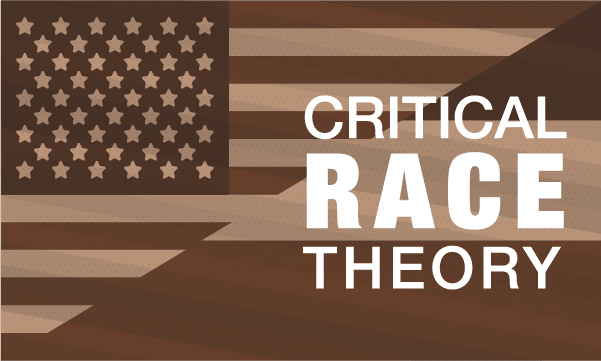 AACTE members took action when the Trump administration issued an attack on critical race theory two months ago. In its blistering critique of anti-racist initiatives, the Administration essentially banned work on critical race theory in use of professional development funded by federal dollars. In partnership with Education Deans for Justice and Equity, AACTE members united in a written response signed by over 400 scholars of race in education, led by Marvin Lynn, dean and professor of the college of education at Portland State University. The memo is as follows:
AACTE members took action when the Trump administration issued an attack on critical race theory two months ago. In its blistering critique of anti-racist initiatives, the Administration essentially banned work on critical race theory in use of professional development funded by federal dollars. In partnership with Education Deans for Justice and Equity, AACTE members united in a written response signed by over 400 scholars of race in education, led by Marvin Lynn, dean and professor of the college of education at Portland State University. The memo is as follows:
Critical Race Theory in Education Scholars Respond to Executive Memo M-20-34
On September 4, 2020, Russell Vought, Director of the Office of Management and Budget for the Executive Office of the President issued M-20-34, a “memorandum for the heads of executive offices and agencies.” The document states, “Executive Branch agencies have spent millions of taxpayer dollars, to date, on ‘training’ government workers to believe divisive, anti-American propaganda.” As critical race scholars working in universities and communities across the globe, the following statement is our response to Mr. Vought’s memorandum.
27 Oct2020
By Ward Cummings

Election season is upon us. According to CNN, more than 50 million Americans have already cast their ballot in the 2020 election by mail or by early voting. Some predict that as many as two-thirds of the electorate will have voted before election day arrives on November 3. The remaining third of Americans will go to their neighborhood polling place next Tuesday and cast their vote in person for the men and women they want to see run their cities, municipalities, states and the country. Across the nation, hundreds of political offices are up for grabs and thousands of men and women have registered to have their names placed on the ballot. Some of the names will be familiar to voters, many more will not be. For those seeking information about candidates and candidate positions on education, AACTE is keenly positioned to help.
23 Oct2020
By Matthew Wales
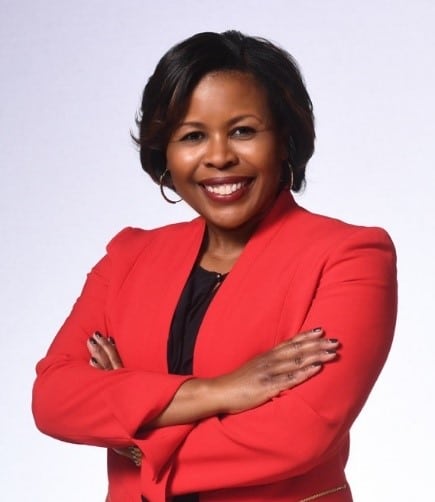 Every year, AACTE typically holds its Leadership Academy as an in-depth, face-to-face, hands-on training for those educators seeking to begin or enhance their roles in academic leadership. Given the current Covid-19 pandemic, AACTE wanted to bring a portion of that experience to its membership, and thus the 2020 Leadership Academy Series was created.
Every year, AACTE typically holds its Leadership Academy as an in-depth, face-to-face, hands-on training for those educators seeking to begin or enhance their roles in academic leadership. Given the current Covid-19 pandemic, AACTE wanted to bring a portion of that experience to its membership, and thus the 2020 Leadership Academy Series was created.
With the theme of Leadership During Difficult Times, the Leadership Academy Series explores topics that are more relevant than ever to our members. The first session of the series, held on October 14, explored how three institutions have risen to the challenge and taken strides to make lasting policy and programmatic changes related to diversity, equity, and inclusion.
Monika Williams Shealey, senior vice president for diversity, equity and inclusion at Rowan University, was one of three distinguished panelists. She recently took time to answer some additional questions from attendees. Here is what she had to say:
23 Oct2020
By Danna Demezier
 The time has come where the realization sets in that there are only 2 months left until the end of the year. I’m not sure about you but I am so ready for a new year, especially for AACTE’s 73rd Annual Meeting in February 2021. I could not think of a better time to encourage current scholars, those who are new and those who are advanced, to submit a proposal for Holmes Preconference.
The time has come where the realization sets in that there are only 2 months left until the end of the year. I’m not sure about you but I am so ready for a new year, especially for AACTE’s 73rd Annual Meeting in February 2021. I could not think of a better time to encourage current scholars, those who are new and those who are advanced, to submit a proposal for Holmes Preconference.
If you are a new scholar, you may experience trepidation or anxiety on presenting or may not know what to do. Poster presentations and roundtable sessions are two great options because they are informal and laid-back.
For the seasoned scholars who have completed most of your coursework, are doctoral candidates, or are preparing to transition into the academy, the job panel, 3-minute thesis talk or dissertation funding competition are excellent platforms to showcase your research and let your light shine as a scholar.
Wherever you are in your educational journey, now is the time to present on your research interests, your dissertation or thesis work, or something that is interesting to you. All proposals are welcome! Please check the AACTE Holmes Scholars website for specific descriptions on the different sessions and review the tip sheet created by the Holmes Research Committee to assist you in preparing your proposal submissions.
Please email me at holmesresearchcommittee@gmail.com if you have any questions. The deadline for submissions is Oct. 31.
23 Oct2020
By JTE
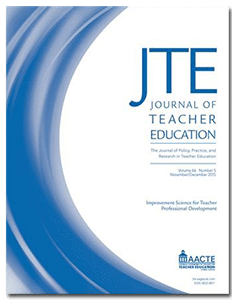 Check out a recent JTE Insider blog interview by the Journal of Teacher Education (JTE) editorial team. This blog is available to the public, and AACTE members have free access to the articles in the JTE online archives—just log in with your AACTE profile.
Check out a recent JTE Insider blog interview by the Journal of Teacher Education (JTE) editorial team. This blog is available to the public, and AACTE members have free access to the articles in the JTE online archives—just log in with your AACTE profile.
This interview features insights on the article entitled, “Rethinking High-Leverage Practices in Justice-Oriented Ways” by Angela Calabrese Barton, Edna Tan, and Daniel J. Birmingham. The article was published in the September/October 2020 issue of the Journal of Teacher Education.
Article Abstract: Justice-oriented teaching must address how classroom-based disciplinary learning is shaped by interactions among local practice and systems of privilege and oppression. Our work advances current scholarship on high-leverage practices [HLPs] by emphasizing the need for teaching practices that restructure power relations in classrooms and their intersections with historicized injustice in local practice as a part of disciplinary learning. Drawing upon a critical justice stance, and long-term collaborative work with middle school teachers and youth, we report on empirically driven insights into patterns-in-practice in teaching which yield insight into both what justice-oriented high-leverage practices may be, and the cross-cutting ideals which undergird them. We discuss the patterns-in-practice and their implications for teaching and learning across subject areas: HLPs that work toward equitable and consequential ends need to be understood in terms of the practice itself and its individual and collective impact on classroom life.
23 Oct2020
By Jerrica Thurman

AACTE’s virtual 2021 Annual Meeting, February 24-26, will offer over 180 concurrent sessions, providing you a full menu of options for enhancing your professional development during these challenging times. Covering four different strands, sessions will feature such tools as case studies, scenario planning, and roundtable discussions to impact educator preparation.
23 Oct2020
By Jacqueline Rodriguez
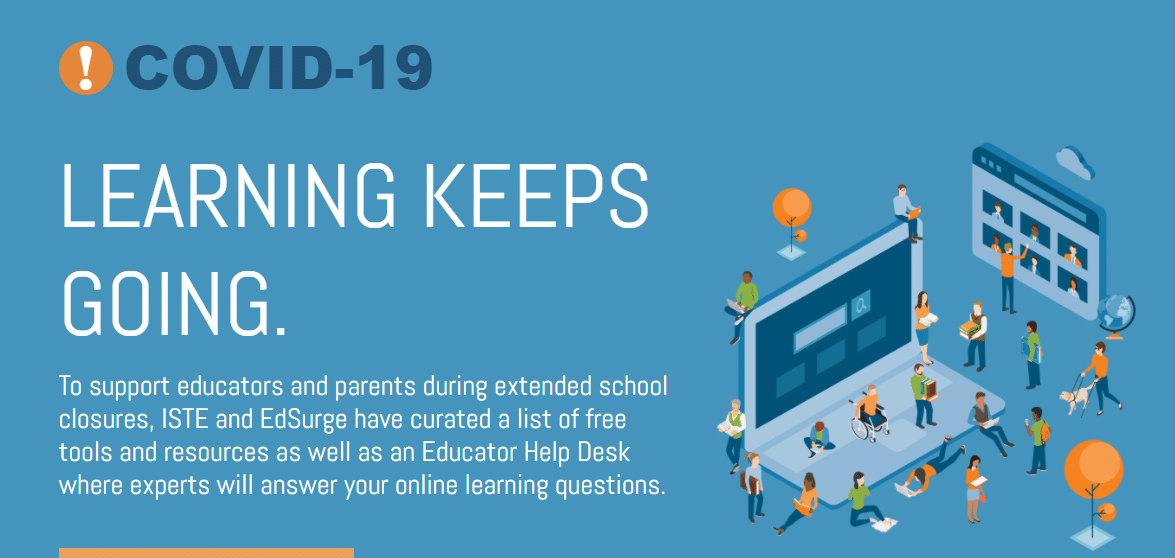 In early spring of 2020, AACTE joined ISTE’s LearningKeepsGoing Coalition. The Coalition subcommittees include Higher Education, of which I co-chair along with AACTE Innovation and Technology Committee Co-Chair David Slykhuis.
In early spring of 2020, AACTE joined ISTE’s LearningKeepsGoing Coalition. The Coalition subcommittees include Higher Education, of which I co-chair along with AACTE Innovation and Technology Committee Co-Chair David Slykhuis.
Each subcommittee developed resources that address the COVID19 pandemic in our nation’s public schools. The Coalition recently released two new resources for Institutions of Higher Education Educator Prep Programs and teacher candidates! The resources target different audiences. The student agency infographic is a resource for educator candidates and educator preparation faculty. As colleges and universities develop online course offerings, candidates are faced with learning how to access and benefit from online instruction. The infographic begins by amplifying five areas of student agency. Ten strategies guide students to advocate for online learning supports, use their own assets, and seek our mentors, to name a few. Students can also take an online learning readiness assessment to determine their preparedness for online instruction. Educator preparation faculty and staff are encouraged to disseminate this infographic to candidates who are learning online.
23 Oct2020
By Nicole Dunn
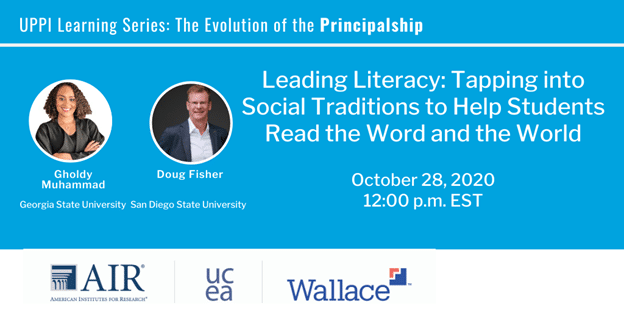
Principals are leading schools through significant challenges and uncertainties and, in the process, some aspects of teaching, learning, and leadership may be indelibly changed. The Evolution of the Principalship learning series is an invitation to join with national experts in considering how principals’ work has changed and how our understanding of school leadership has evolved. Throughout this learning series, which is supported by the Wallace Foundation and organized by the American Institutes for Research (AIR) and the University Council of Education Administration (UCEA), we will talk with principals, researchers, and other experts about the following:
- What have the disruptions in schooling taught us, as principals and education leaders?
- How have principals’ priorities and daily work changed as a result of the COVID-19 pandemic? Which changes are temporary, and which are indelible?
- How can leadership and learning capitalize on community social and cultural histories to deepen engagement, achievement and equity?
- What do the changes to school leadership mean for principal pipeline supports, including principal preparation and professional learning?
As you participate in these free online sessions, you can expect national experts to share their research and tools, and to engage you in dialogue about the evolution of school leadership.
23 Oct2020
By Margaret Caspe
 Decades of research confirm the importance of families, schools, and community working together to launch students on successful trajectories. Yet, teachers attribute lack of preparation as one of their greatest barriers to building relationships with families and their greatest fear for failure. As a result, in January of 2020, the National Association for Family School and Community Engagement (NAFSCE) partnered with AACTE, CAEP, MAEC, the NEA, and selected faculty and state leaders to form the Pre-Service Family Engagement Consortium to enhance how educators are prepared to engage families and communities.
Decades of research confirm the importance of families, schools, and community working together to launch students on successful trajectories. Yet, teachers attribute lack of preparation as one of their greatest barriers to building relationships with families and their greatest fear for failure. As a result, in January of 2020, the National Association for Family School and Community Engagement (NAFSCE) partnered with AACTE, CAEP, MAEC, the NEA, and selected faculty and state leaders to form the Pre-Service Family Engagement Consortium to enhance how educators are prepared to engage families and communities.
23 Oct2020
By Jacqueline E. King, Ph.D.
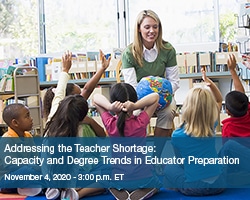 Before the coronavirus pandemic, there were significant teacher shortages in many communities. Since the pandemic began, teacher retirements and other departures from the profession have accelerated. Can the nation’s higher education institutions meet the demand for new teachers, particularly in high-demand fields such as special education, STEM, and foreign language? What do trends over the last decade portend for the future of educator preparation?
Before the coronavirus pandemic, there were significant teacher shortages in many communities. Since the pandemic began, teacher retirements and other departures from the profession have accelerated. Can the nation’s higher education institutions meet the demand for new teachers, particularly in high-demand fields such as special education, STEM, and foreign language? What do trends over the last decade portend for the future of educator preparation?
An upcoming webinar will review the findings from two new AACTE issue briefs that address these questions:
- Institutions Offering Degrees in Education: 2009-10 to 2018-19
- Degree Trends in High-Demand Teaching Specialties: 2009-10 to 2018-19
22 Oct2020
By Hannah Reeder and Betsy Rosenbalm
This is Part 1 of an article by Hannah Reeder and Betsy Rosenbalm of Appalachian State University in which they share how they had to pivot student teaching and new teacher preparation during the spring 2020 semester as a direct result of the COVID-19 pandemic.

When schools suddenly closed in March of 2020, student teachers and beginning teachers quickly shifted their newly learned pedagogical skills to deliver instruction and grow professionally almost solely by virtual means. The Office of Field Experiences and the Public School Partnership in the Reich College of Education at Appalachian State University supplied an uninterrupted flow of resources, professional development, and interaction with professional educators in the field. This shifted from pivoting out of necessity to attempting to disrupt the status quo. We were quickly introduced to “our new normal”!
Appalachian State University has18 teacher education programs and produces about 450-500 teachers each year. During the student teaching semester, teacher candidates are placed in 45 districts across the state of North Carolina and supervision is conducted by 30-40 part-time University Field Supervisors.
The Public School Partnership provides support, professional development, and resources to 12 school districts in the northwest region of North Carolina. The NC New Teacher Support Program is housed in the Public School Partnership. This program provides weekly coaching and regular professional development to teachers in their first, second, or third years of teaching in those same districts within our area of the state.
22 Oct2020
By AACTE
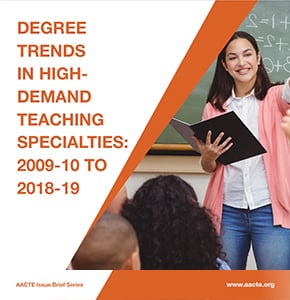
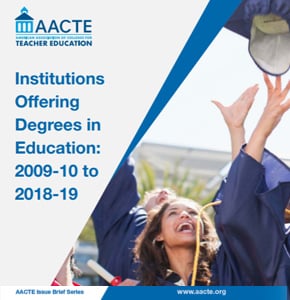
The American Association of Colleges for Teacher Education (AACTE) released today two new issue briefs, Institutions Offering Degrees in Education: 2009-10 to 2018-19 and Degree Trends in High-Demand Teaching Specialties: 2009-10 to 2018-19. The reports examine education trends through an analysis of the number of institutions awarding degrees in education and the imminent threat of increased teacher shortages , particularly in high-demand areas. The findings raise significant concerns about the nation’s future capacity to produce new teachers and other education professionals to meet the diverse needs of students, families, and communities.
The Institutions Offering Degrees in Education report describes the number of institutions awarding degrees in education from 2009-10 to 2018-19, and offers a table listing of institutions awarding any degree in education by state and institution type during this period. It reveals that, while the number of institutions offering degrees in education has been stable, the number of institutions with small programs, defined as awarding 30 or fewer degrees and certificates annually, rose by 21%. These institutions currently make up one-third of all colleges and universities awarding education degrees. Of critical importance is that the average number of education graduates across all institution types fell by 24% from 2009-10 to 2018-19.
22 Oct2020
By Andre ChenFeng
“We are more than test scores.” That was the refrain I heard from my social sciences colleagues in the teachers’ lounge protesting our school’s focus on standardized tests. The middle school was located in a poverty-impacted community with over 95% of students of color. In 2009, I was finishing my fifth-year teaching and recall asking myself, “Why are the standardized tests such an evil thing? Don’t we need assessments to measure what the students are learning?” (ChenFeng, 2009).
One of the signature education policies in my early career was the No Child Left Behind (NCLB) Act of 2002. Teachers have different opinions of NCLB, but most educators and policy makers would agree that NCLB brought upon a culture of “over-testing and one size fits all mandates” (Duncan, 2015). During the 12 years I taught middle school math in Los Angeles, not once did I examine the intersection of white supremacy and education policy in my own classroom instruction. Overwhelmed by the high-stakes testing environment, and with a roster of 130 students, I was not aware of the impact of federal education policy on my teaching beliefs and instruction. In retrospect, I upheld color-evasive ideology and believed in a pedagogy that promoted the myth of meritocracy (Bonilla-Silva, 2017 as cited in Diem & Welton, 2020). In other words, I did not consider how race and racism shows up in the classroom or the ways I was complicit in perpetuating the false notion of pulling ourselves up by the bootstraps.
20 Oct2020
By Nicole Dunn
AACTE invites you to participate in a webinar hosted by the Wallace Foundation and RAND to discuss insights from The Partnerships for Social Emotional Learning Initiative (PSELI).
PSELI is a comprehensive, multiyear initiative funded by The Wallace Foundation to explore whether and how students can benefit from intentional partnerships between schools and afterschool/out-of-school time programs focused on building social-emotional skills—and what it takes to do this work.
This free webinar, will share important insights from a new RAND report, Early Lessons From Schools and Out-of-School Time Programs Implementing Social and Emotional Learning, that examines 38 sites in six communities during the first two years of the PSELI initiative. AACTE encourages members not to miss this event at a time when interest in SEL is outstripping empirical guidance about how to implement these programs and practices.
Researchers from RAND will focus on topics such as developing adults’ capacity to promote SEL, improving climate and delivering SEL instruction to students, executing system-level activities to launch and coordinate SEL work across multiple sites, and developing partnerships between schools and afterschool/out-of-school time programs.


 AACTE members took action when the Trump administration issued an attack on critical race theory two months ago. In its blistering
AACTE members took action when the Trump administration issued an attack on critical race theory two months ago. In its blistering
 Every year, AACTE typically holds its Leadership Academy as an in-depth, face-to-face, hands-on training for those educators seeking to begin or enhance their roles in academic leadership. Given the current Covid-19 pandemic, AACTE wanted to bring a portion of that experience to its membership, and thus the
Every year, AACTE typically holds its Leadership Academy as an in-depth, face-to-face, hands-on training for those educators seeking to begin or enhance their roles in academic leadership. Given the current Covid-19 pandemic, AACTE wanted to bring a portion of that experience to its membership, and thus the  The time has come where the realization sets in that there are only 2 months left until the end of the year. I’m not sure about you but I am so ready for a new year, especially for AACTE’s 73rd Annual Meeting in February 2021. I could not think of a better time to encourage current scholars, those who are new and those who are advanced, to submit a proposal for Holmes Preconference.
The time has come where the realization sets in that there are only 2 months left until the end of the year. I’m not sure about you but I am so ready for a new year, especially for AACTE’s 73rd Annual Meeting in February 2021. I could not think of a better time to encourage current scholars, those who are new and those who are advanced, to submit a proposal for Holmes Preconference. Check out a recent
Check out a recent 
 In early spring of 2020, AACTE joined ISTE’s
In early spring of 2020, AACTE joined ISTE’s 
 Decades of research confirm the importance of families, schools, and community working together to launch students on successful trajectories. Yet, teachers attribute lack of preparation as one of their greatest barriers to building relationships with families and their greatest fear for failure. As a result, in January of 2020, the National Association for Family School and Community Engagement (NAFSCE) partnered with AACTE, CAEP, MAEC, the NEA, and selected faculty and state leaders to form the
Decades of research confirm the importance of families, schools, and community working together to launch students on successful trajectories. Yet, teachers attribute lack of preparation as one of their greatest barriers to building relationships with families and their greatest fear for failure. As a result, in January of 2020, the National Association for Family School and Community Engagement (NAFSCE) partnered with AACTE, CAEP, MAEC, the NEA, and selected faculty and state leaders to form the  Before the coronavirus pandemic, there were significant teacher shortages in many communities. Since the pandemic began, teacher retirements and other departures from the profession have accelerated. Can the nation’s higher education institutions meet the demand for new teachers, particularly in high-demand fields such as special education, STEM, and foreign language? What do trends over the last decade portend for the future of educator preparation?
Before the coronavirus pandemic, there were significant teacher shortages in many communities. Since the pandemic began, teacher retirements and other departures from the profession have accelerated. Can the nation’s higher education institutions meet the demand for new teachers, particularly in high-demand fields such as special education, STEM, and foreign language? What do trends over the last decade portend for the future of educator preparation? 

